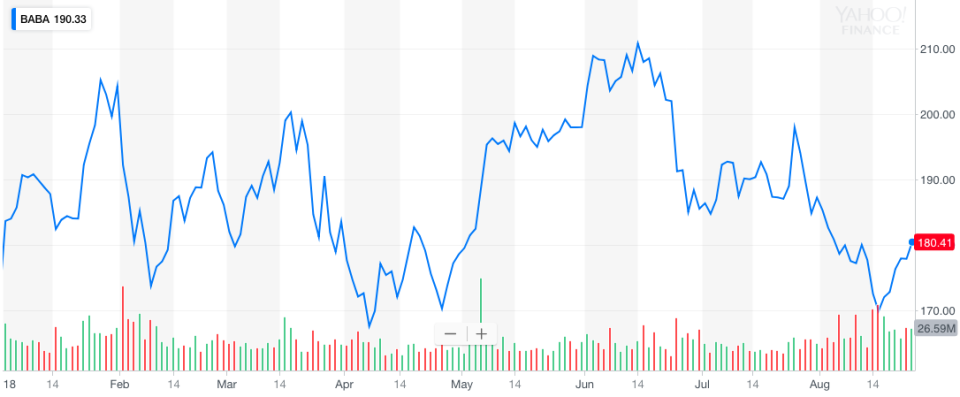Alibaba says it’s well-positioned in a US-China trade war
The U.S.-China trade war doesn’t seem to be hurting Alibaba’s bottom line for now. On Thursday, the e-commerce giant reported a strong quarter with revenue growth of 61%, sending the stock (BABA) up by as much as 4% in early morning trading. But later in the day its shares pulled back over concerns about investments that can squeeze margins and overall macro concerns.
Alibaba said it’s well-positioned as trade tension escalates because it can source products outside the U.S. Amid trade disputes, China has been accelerating its efforts to reduce its reliance on investments and exports. That shift could further boost Alibaba’s core retail business.
Alibaba can source elsewhere other than the U.S.
President Donald Trump’s tariffs have raised concerns among investors about Alibaba’s global expansion. Rather than selling directly to American consumers, Alibaba’s focus in the U.S. market is to help U.S. businesses reach consumers in China. For instance, just last week, Kroger (KR) set up its flagship store using Alibaba’s Tmall platform, to sell everything from nuts to organic chips to China’s middle-class consumers.
Some of the products could be subject to extra duties in tit-for-tat tariffs between the Washington and Beijing. The added cost may put some price pressure on Kroger and many other smaller U.S. businesses, making them less appealing to Chinese consumers.
“If U.S. goods become too expensive due to tariffs, Chinese consumers can shift to domestic producers or imports from other parts of the world in terms of our international expansion,” said Joe Tsai, executive vice chairman of Alibaba, on Thursday’s earnings call. “The world is a big place.”
Chinese consumers are usually fans of high-quality food products from the U.S. Amid growing trade tension, Alibaba has been deepening partnerships with other markets like Australia and Canada, to import similar products, such as seafood, that it has sourced from the U.S.
Selling platforms like Taobao and Tmall are a revenue engine for Alibaba. Tsai didn’t go into details about how tariffs may affect Alibaba’s selling business in the U.S. On Alibaba’s AliExpress website, Chinese suppliers ship directly to worldwide buyers, including U.S. Some products on that platform will likely be subject to Trump’s new round of tariffs, which include many consumer goods.
Alibaba will benefit from the growth of demand

Even if tariffs don’t hurt Alibaba, investors still worry about the trickle-down effect of the trade war on China’s economy. Alibaba’s stock is widely seen as a proxy to bet for or against the world’s second-largest economy.
From Jack Ma to Joe Tsai, Alibaba executives have been bullish on the Chinese economy. They believe the transition of China’s economic growth could help the country weather through a trade war scenario, and further boost Alibaba.
“It is clear that nobody wins in a trade war. Over the years, China has become less reliant on exports so that the Chinese economy can withstand the imposition of tariffs on Chinese products,” Tsai said.
The Chinese government wants to upgrade the country’s image as a labor-intensive manufacturing hub. Domestic consumptions now contribute to more than 60% of its GDP growth.
By investing extensively in entertainment and local service businesses, Alibaba is betting big on the expansion of the middle-class in China, which now makes up less than half of the country’s population at about 430 million. China’s savings rate, as a percentage of GDP, is over 50%, while the U.S. rate is less than 20%. Household debt to GDP ratio has grown to 48.4%, while the number is 78.7% in the U.S. With a high savings rate and modest debt burden, Chinese households are likely to continue to power the country’s GDP growth.
“Alibaba’s business is focused on Chinese domestic consumption opportunity and less reliant on Chinese exports,” said Tsai. “We believe that Chinese government policy will continue to support imports into China to satisfy the rising demand of Chinese consumers.”
Krystal Hu covers technology and economy for Yahoo Finance. Follow her on Twitter.
Read more:
The real reason why traders are shorting Alibaba
How Apple succeeded in China, where other tech giants have failed
Inside Amazon’s little-known graphic T-shirt-making business

 Yahoo Finance
Yahoo Finance 
